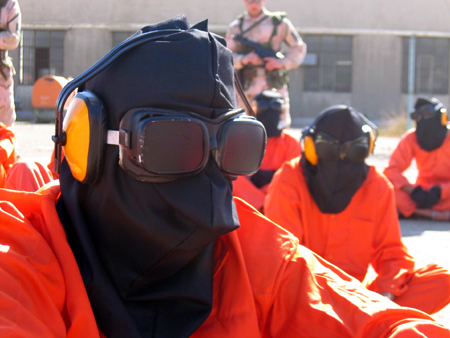|
Reviews of Recent Independent, Foreign, & Documentary Films in Theaters and DVD/Home Video
Directed by: Michael Winterbottom & Mat Whitecross. Produced by: Andrew Eaton & Melissa Parmenter. Director of Photography: Marcel Zyskind. Music by: Harry Escott & Molly Nyman. Released by: Roadside Attractions. Country of Origin: UK. 91 min. Rated: R. With: Riz Ahmed, Farhad Harun, Waqar Siddiqui & Arfan Usman.
In the press notes, director Michael Winterbottom describes his role as being
like a lawyer, interested only in retelling his clients’ story, word for word. That’s an important distinction to make, especially for
any docudrama, with its blurry line between reporting and retelling. And with the
subject of Guantánamo Bay being almost virtually unverifiable, why not just stick to your clients’ words and make the most
compelling, passionate case that you can? That’s what codirectors Michael Winterbottom and Mat Whitecross have done here, after
Whitecross spent a month living with the men who are subjects of this film. (Over 650 pages of transcribed interviews were accumulated.)
From the town of Tipton in the English Midlands, four British men of Middle-Eastern descent traveled to Pakistan for a wedding in September 2001. Without much explanation, the young men decide to heed an Imam’s call to give aid to Afghanis. Not long after they have crossed into Afghanistan, they hear the first US bombs fall in the distance. One of the four is lost during an evacuation and never found. In the resulting turmoil, the remaining three are captured by Allied forces and then informally accused of everything from plotting terrorist attacks with Al Qaeda to being personally acquainted with Osama bin Laden. They’re deported to America’s now-infamous Cuban military base, and – according to the men – beaten, humiliated and treated like animals.
Winterbottom uses the same cinematographer, Marcel Zyskind, as he did in 24 Hour Party People and the
recent Tristram Shandy: A Cock and Bull Story. Here, the talking head interviews of the Tipton Three contrasts with the
dramatizations, shot in Iran and Afghanistan. The combination of visual styles makes each film – including this one – somewhat
startling. But with its handheld camera, The Road to Guantánamo creates the same sense of confusion the four men felt during their ordeal.
Without a doubt, the Tipton Three provide riveting and relevant material, resulting in a fast-paced film that’s hard to
turn away from. But at times, they describe events that were not filmed, forcing the audience to guess at the men’s internal
experience. As a result, it's a thin line between spelling things out and giving too little information – Guantánamo veers
to the latter. The men become confusingly indistinct from one another, since Winterbottom and Whitecross focus on the details
of the men’s imprisonment rather than the need to show each man as an individual. However, the actors portraying the men are
fantastic, even though none of them had acted previously.
Whatever political philosophy you take with you into the theater, you're
likely to leave with it intact. It's easy to point to this film as a banner
against the war on terror’s abuses, but it's also easy to refer to this film, in its entirety, as an unverifiable reenactment. It's both.
Zachary Jones
|

